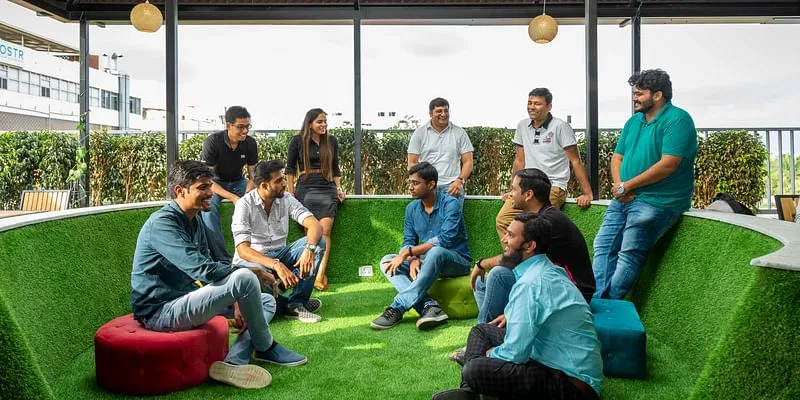How BlackBuck is bringing India’s trucking industry back to life amidst coronavirus
B2B logistics startup BlackBuck’s new initiative Move India aims to bring the logistics industry back to its former glory by providing trip insurances, coronavirus relief, health insurance, and waiving off commissions for fleet owners.
While the coronavirus pandemic has affected almost all legacy sectors, logistics is one of the worst affected. Essential items still need to be transported, but they only make up about 15 percent to 20 percent of the industry’s output.
This means, close to 80 percent of the logistics sector is on a standstill. More importantly, India’s logistics industry, worth $120 billion according to ASSOCHAM, includes almost 40 lakh trucks.
“The sudden drop in the movement of goods, especially non-essentials, has adversely impacted fleet owners, truck drivers, distributors, and transporters among others,” says Rajesh Yabaji, Co-founder and CEO of .
Kickstarting the sector
Even as moving becomes a problem, one of the other major challenges has been to get truckers and drivers on the roads.
The trucking industry functions on the highway network spread across almost three lakh km. However, most of the 70,000 petrol pumps operating on these roads are shut. So are the eateries. Additionally, drivers themselves are scared about contracting the deadly coronavirus.
“Logistics employs one of the largest human capital in the country, and has a strong correlation to key economic indices, including inflation, current deficit, and overall GDP, among others,” adds Rajesh.

Founders of BlackBuck - B Ramasubramanian, Chanakya Hridaya, Rajesh Yabaji.
As a result, to kickstart the movement of goods across the country, reviving the supply chain amidst the coronavirus pandemic, BlackBuck launched the Move India initiative.
The Bengaluru-based startup plans to use its technology and the strength of its truck and transporter network and aims to enable over five lakh fleet owners with more than 10 lakh trucks, to discover demand, get access to services, including FASTag, GPS, and fuel cards, and earn more.
“Our planning was largely focussed around identifying key issues pertinent to transportation where we can be of assistance and finding solutions that stood highest in impact. The rest was about finding the right partners for maximum outreach,” explains Rajesh.
BlackBuck plans to also extend its platform and commission waiver to more than 20,000 small-time transporters, mandi sellers, and distributors, who are not a part of its ecosystem yet. This will be executed via a one-call booking helpline over the next one month.
Manufacturers, traders, and other shippers who have either started production or have stock ready can use BlackBuck’s platform to gain access to over a million trucks, which can be booked instantly and at the lowest possible prices to transport products across the country.

Team at BlackBuck
More than one way to help
The startup has completely waived off commission to encourage the trucking community to come on the platform and resume operations.
It has also come up with several safety nets, including direct money transfers (DMTs) and trip insurance to ensure that the truckers are supported and cared for as they work towards getting India’s economy moving ahead once again.
BlackBuck is offering an added incentive of Rs 2,000 to Rs 3,000 for fleet owners on every trip they undertake. For several large fleet owners, the added incentive alone will run into lakhs, encouraging them to start full-fledged operations.
Move India has also committed to taking responsibility for the health of driver partners, setting up a Rs 50 crore relief fund for them if they contract COVID-19 in the line of duty.
It will offer a relief package of Rs 50,000 in the form of direct Money Transfer (DMTs) to the affected driver partners. The startup has opened a free helpline for the affected drivers to reach out to BlackBuck.
In addition to this, on every trip undertaken, it will offer free trip insurance inclusive of hospitalisation expenses of up to Rs 50,000 for its driver partners in case of an accident, and a term cover of Rs 3 lakh for their families in case of an unfortunate demise or permanent disability.
Changing the impact
“High imbalance between demand and supply across difference sectors, unpredictable freight prices, lack of health security, and protection for drivers continue to be challenges that have dampened the recovery process,” says Rajesh.
BlackBuck has over four lakh partner trucks empanelled on the platform, operating pan India in over 500 districts and 400 industrial hubs. It has over 30,000 clients, including SMEs and large corporates such as Asian Paints, Coca Cola, ITC, Tata Steel, and Hindustan Unilever.
On what needs to be done next, Rajesh says,
“We need to resume manufacturing to move goods; this means, we need to resume a balance between supply and demand by providing wider access to load/trucks. We also need to provide financial relief to truck owners, transporters, distributors, farmers and agent community to help them recover the loss.”
Last but not least, he adds that there is an urgent need to ensure financial and health security to the blue-collar workforce, including truck drivers, to resume working.
“The government has been very proactive in controlling the outbreak of COVID-19 until now. We are confident that tapering growth rate of COVID-19 and removal of restrictions over time in a phased manner in non-hotspot regions will significantly contribute to the recovery process,” adds Rajesh.
Edited by Saheli Sen Gupta









